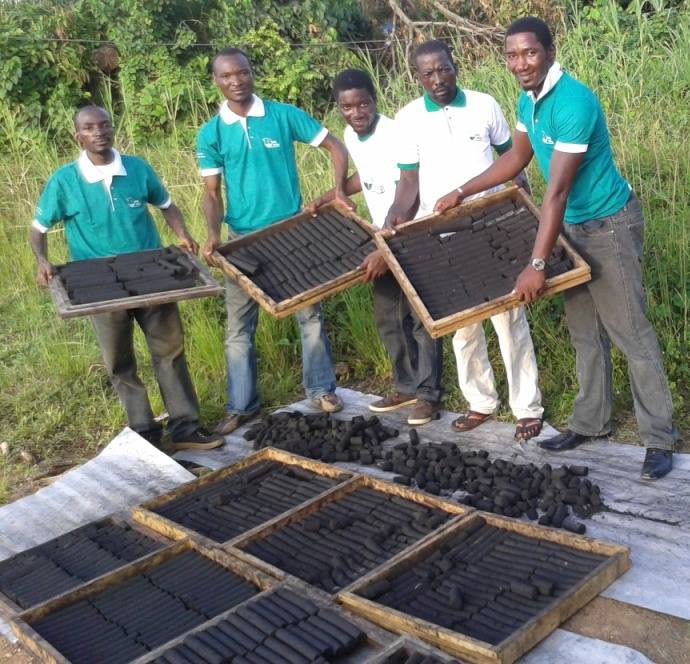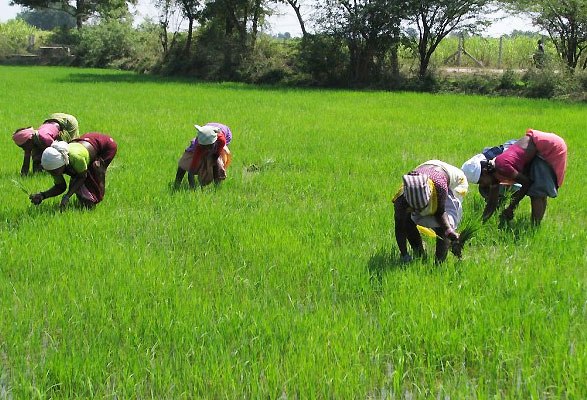
By Elias Ntungwe Ngalame
An initiative by a group of Cameroonian youths to produce eco-friendly charcoal made from biodegradable household waste is not only helping to fight against mangrove deforestation in the coastal town of Douala, the economic capital, but also reducing deadly floods and high youth unemployment.
According to Kemit Ecology, a non-governmental organization run by young people, the group uses household waste such as maize husks, banana and plantain peelings, fish scales, sugarcane peels and other bio-degradable waste to produce and sell 100% eco-friendly charcoal that replaces the growing demand for wood for cooking or heating.
« Producing charcoal from household waste to save the forest is an enriching experience for us, » Says Muller Tankeu Nandou, coordinator of Kemit Ecology.
The organisation says it has a group of over 100 youths employed to collect household waste from homes, markets and street gutters.
Some households supporting the idea also prefer to deposit their waste directly at the production site of the organisation.
Apart from employing youths, the organisation supplies bio-degradable coal to thousands of women selling coal in different markets in Douala and other towns in the country thus keeping women who otherwise would have been idle active.
« We work most with market women and households who are very collaborative, » Muller says.
The material gathered is later sorted, dried, compacted and burned to make charcoal. The organisation says its efforts are already helping to protect the mangrove forest and reduce the rate of floods in some parts of the city.
Environment experts say the coastal mangrove forest that has suffered over-exploitation and reduced by half over the last 20 years now have
some respite since the project started some four years ago.
« There have been overuse and often illegal use of the forest by the growing population in Douala. Saving especially the coastal mangrove forest has become crucial, » says Samuel Nguiffo CEO of Centre for Environment and Development, an NGO that defends the rights of forest people in Cameroon.
With sensitization from the Douala city councils working in partnership with Kemit Ecology the fishing community and thousands of households in the over 3 million population in the city that hitherto used wood for drying fish and cooking are increasingly switching over to use eco-friendly coal, officials of Kemit Ecology say.
The team says it has considerably expanded production since they started in 2014. In 2014, they manually produced 12 tonnes of charcoal. Now, they have machinery and a factory, and, by 2016, had increased to 37 tonnes produced and sold per year . They envisage producing over 200 tonnes of charcoal per year by 2020.
A kilogram of eco-friendly charcoal sells at 300 fcfa, far lower than that of wood charcoal selling at 450 fcfa.
« One can save up to 25% and 40% of the money spent on firewood and charcoal respectively and above 50%with gas and electricity, » says Abu Wilson, commercial manager of Kemit Ecology
.
Using eco-friendly charcoal saves the environment in two ways he says.
« First, they are an alternative to firewood and charcoal. Secondly, the technology has increased agricultural waste utilisation, hence a cleaner environment, »
Consumers say they prefer the eco-friendly charcoal that produces more heat and less smoke.
« I am at ease with eco-friendly charcoal because it cooks faster and produces less smoke, » says Agnes Ebai who runs a restaurant in Douala.
The initiative by Kemit Ecology has won both national and international acclaim. The project in November 2016 was recognized at the COP22 Climate Change conference in Morocco, winning the Young Green Entrepreneur category of the Climate Initiatives award.
According to the ministry of trade, annual consumption of charcoal exceeded 300, 000 tonnes in 2016 in Cameroon with supply coming mostly from wood in the forest, thus the need to encourage more production of eco-friendly charcoal to meet demand and protect forest.
Government says the initiative by the team should be encouraged and replicated to other regions where forest is highly threatened.
« Initiatives to protect the environment and fight especially youth unemployment should be encouraged and supported by the government, » says Sale Solomon, chief of service in the programmes department in the ministry of trade.
The head of Kemit Ecology says one of their biggest challenges is to have the appropriate waste material supply on a daily bases.
They are thus working in partnership with the local councils, households, fishermen and fish market women, business owners in market places where they distribute bags for collection of only biodegradable waste.
« We have thus partnered with different stakeholders, shopkeepers in some markets in the city, fruit vendors who are supplying banana plantain peelings and other waste from fruits and food items for Kemit Ecology,” Muller says.
The youths driving the project say they are looking towards the future with optimism.
“For us, the urgency is to provide a solution to the growing but vulnerable population the mangrove area in Douala and save the forest capital,” the project leader says.












